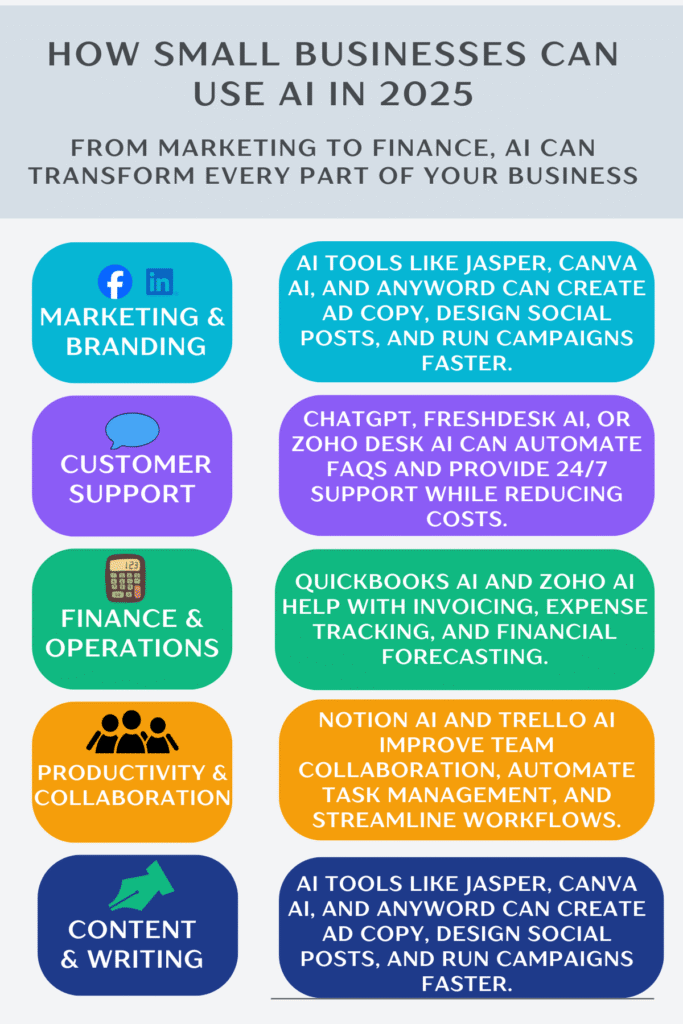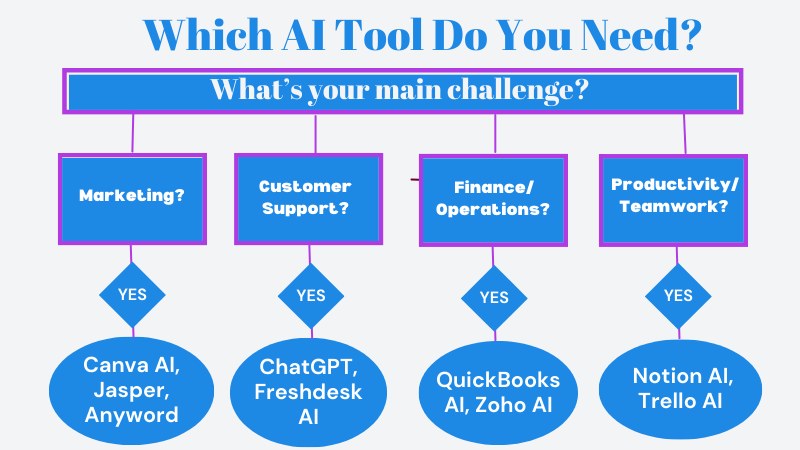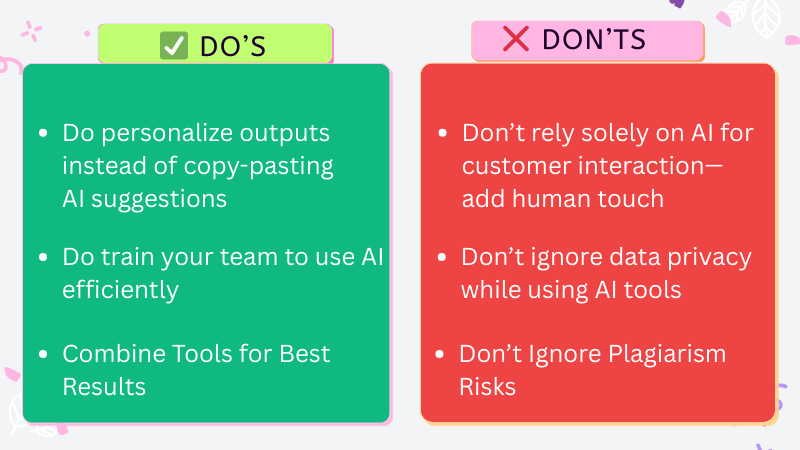Introduction

Running a small business in 2025 is both exciting and challenging. Competition is fierce, customers expect quick responses, and digital presence is no longer optional. Thankfully, AI tools for small business owners in 2025 make it easier than ever to manage daily tasks, market products, engage customers, and grow without breaking the bank.
Whether you’re a solopreneur, a local shop owner, or managing a small team, the right AI software can act as your extra helping hand—automating routine work and letting you focus on growth.

Why Small Businesses Should Use AI in 2025
AI is no longer just for tech giants. Small businesses are using AI every day for:
Marketing automation – smarter ad campaigns, targeted emails
Customer support – instant chatbots and 24/7 responses
Content creation – blogs, posts, and graphics in minutes
Operations – inventory, invoices, scheduling
Cost savings – fewer manual hours, fewer mistakes


Top AI Tools for Small Business Owners in 2025

1. Jasper AI – Content Marketing Made Simple
Why Small Businesses Love It: Creates blogs, ads, and website copy in minutes.
Free Plan: Trial available
Best Use Case: Content marketing & SEO

2. Canva AI – Design Without a Designer
Why Small Businesses Love It: Easy drag-and-drop graphics, AI templates, and branding kits.
Free Plan: Yes
Best Use Case: Social media posts, ads, flyers

3. Zoho AI – Business Management All-in-One
Why Small Businesses Love It: CRM, invoicing, and customer management powered by AI insights.
Free Plan: Yes (basic features)
Best Use Case: Managing clients & sales

4. GrammarlyGO – Smarter Writing Assistant
Why Small Businesses Love It: Helps polish emails, proposals, and website text.
Free Plan: Yes
Best Use Case: Business communication

5. ChatGPT (OpenAI) – Customer Support & Ideas
Why Small Businesses Love It: Can answer customer queries, brainstorm ideas, or even act as a chatbot with integrations.
Free Plan: Yes (basic version)
Best Use Case: Customer service & idea generation

6. HubSpot AI – Marketing & Sales Automation
Why Small Businesses Love It: Automates email campaigns, customer tracking, and reporting.
Free Plan: Yes (limited features)
Best Use Case: Marketing campaigns & lead management

7. QuickBooks with AI – Smart Accounting
Why Small Businesses Love It: AI-powered insights for bookkeeping, invoices, and cash flow.
Free Plan: No (trial available)
Best Use Case: Accounting & finance
Comparison Table: Best AI Tools for Small Business Owners in 2025
| AI Tool | Best For | Free Plan | Ease of Use | Unique Feature | |
|---|---|---|---|---|---|
| Jasper AI | Blog writing, ads, SEO content | Trial only | ⭐⭐⭐⭐ | Pre-built marketing templates | |
| Canva AI | Social media graphics, branding kits | ✅ Yes | ⭐⭐⭐⭐⭐ | AI design suggestions & Magic Resize | |
| Zoho AI | CRM, invoicing, client management | ✅ Yes | ⭐⭐⭐⭐ | All-in-one AI-powered business suite | |
| GrammarlyGO | Email writing, proofreading | ✅ Yes | ⭐⭐⭐⭐⭐ | Context-aware rewrite suggestions | |
| ChatGPT | Customer queries, brainstorming | ✅ Yes | ⭐⭐⭐⭐ | Versatile use cases (chat, support, idea gen) | |
| HubSpot AI | Marketing automation & lead tracking | ✅ Yes | ⭐⭐⭐⭐ | Predictive customer insights | |
| QuickBooks AI | Accounting, invoicing, cash flow | Trial only | ⭐⭐⭐ | AI-powered financial insights |
How to Choose the Right AI Tool for Your Business
With dozens of AI platforms available in 2025, small business owners often feel overwhelmed. The key is not to use every tool out there, but to pick the ones that solve your most pressing business problems. Here’s a step-by-step approach:
✅ Start with free versions or trials
✅ Identify your biggest pain point (marketing, support, finance)
✅ Pick tools that integrate with your existing software
✅ Don’t overload—start with 1–2 tools and expand gradually

Practical Tips for Using AI in a Small Business
Adopting AI toolscan save time and reduce costs, but the way you use them matters just as much as the tools themselves. Small business owners often fall into two traps: either they over-rely on AI or underutilize its true potential. To strike the right balance, here are some practical do’s and don’ts you should follow:
-
Do personalize outputs instead of copy-pasting AI suggestions
-
Do train your team to use AI efficiently
-
Don’t rely solely on AI for customer interaction—add human touch
-
Don’t ignore data privacy while using AI tools

FAQs – AI Tools for Small Business Owners in 2025
Q1: Are AI tools affordable for small businesses?
Yes, most AI tools have free or affordable starter plans designed for small teams.
Q2: Can AI replace employees in a small business?
No. AI is best for handling repetitive tasks so that owners and employees can focus on strategy, creativity, and customer care.
Q3: Which is the best AI tool for marketing a small business?
Canva AI (for design) and HubSpot AI (for marketing campaigns) are excellent starting points.
Q4: Is it safe to use AI tools for handling customer data?
Yes, but always check privacy policies and choose reputable providers like Zoho, HubSpot, or QuickBooks.
Conclusion

The future of small businesses lies in working smarter, not harder. With AI tools for small business owners in 2025, you can manage marketing, design, accounting, and customer support more efficiently without hiring extra staff.

For a complete overview of AI across industries, check out our Best AI Tools and Software in 2025 guide.
Disclaimer
The insights shared in this blog, “Best AI Tools for Small Business Owners in 2025,” are meant to guide and inspire small business owners exploring AI solutions. They are not a substitute for personalized business, financial, or legal advice. The tools highlighted are based on 2025 trends and available features at the time of writing; however, software providers may update pricing, features, or policies without notice. Readers are encouraged to test free versions or trials before investing in premium plans. While some links may be affiliate links, they do not affect our editorial independence—our goal is to help small businesses make smarter technology decisions.
